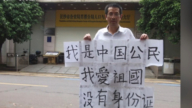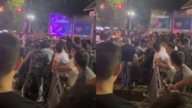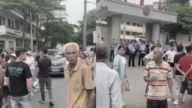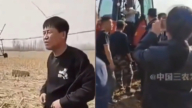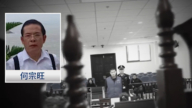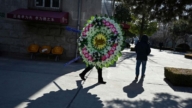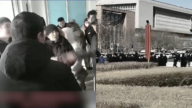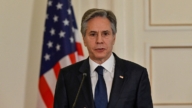【新唐人2015年2月16日訊】「尋釁滋事罪」、「煽動民族仇恨罪」、「顛覆國家政權罪」、「聚眾擾亂社會治安罪」、「利用邪教組織破壞法律實施罪」等等、等等,這些罪名指控的對像,很難想象竟然是律師的群體。然而,這正是中國維權律師所面臨的現狀。因為代理所謂的「敏感」案件,有越來越多的維權律師被冠以上述罪名拘捕或者判刑,請看一下報導。
據香港《中國維權律師關注組》最新統計數據顯示,大陸維權律師在2014年間被刑事起訴和無法執業的人數達到13人,是2013年的4倍。
調查顯示,這些律師無一例外是因為代理所謂「敏感案件」而遭到司法局各種手段的打壓。
深圳律師范標文:「一是辦理敏感案件,第二是我們在法庭上指責司法機關或者是公訴機關的違法行為,或者是在法庭上指出審判員違法審判的情形,這方面得罪了官方。」
雖然到目前為止,大陸沒有任何法律條文對所謂「敏感案件」作出明確規定。但「敏感案件」四個字卻一直是中國律師界不敢碰觸的雷區。禁止代理「敏感案件」成了所有律師事務所不成文的規定。
廣東律師王全平:「司法局會這樣子控制,叫這個律師所,如果這個案件不準律師代理,它就不出這個手續,從這個方面已經阻止律師去代理那些維權案件,有大部份是這個情況。你沒有所函,沒有律師所的介紹信,你就無法去辦那些維權案件。」
據大陸各地司法部門下達的《關於律師代理敏感案件管理意見》顯示,幾乎所有關乎社會民生,容易引發民憤的案件,尤其是群體性事件,全部被納入「敏感」範圍。如涉及房屋拆遷、土地徵用、下崗安置、欠薪、工傷賠償、基層民主選舉、司法部門執法不公以及政府部門違法侵害群眾利益等案件。
此外,還有某些案件被命令禁止代理,如法輪功案、宗教信仰案、已經被新聞媒體跟蹤報導的案件、涉黑群體性案件和重大人員傷亡案件等。
上述各類「敏感」案件被禁止代理的原因是,它們危害了「國家安全」和「黨的執政地位」。
王全平:「這些敏感案件都是政府它們當局自己定的。甚麼叫『敏感』案件呢?全世界都沒有這個說法的!哪個國家有『敏感』案件的說法?都是依法辦案。你政府說這個案件敏感,憑甚麼定的是『敏感』?不就是政府官員違法亂紀嗎?你怕這些腐敗事情曝光。」
中共司法部部長吳愛英曾在2009年公開指示,律師在代理「敏感」案件時,要「講政治、顧大局」、「堅持黨的領導」、「維護黨的執政地位」。此外為了進一步「監督」律師工作,當局還對全國所有無黨員律師事務所,駐派了中共指導員和聯絡員。
在黨的「指導」和「監督」下,很多律師陷入了「為民維權」還是「為黨說話」的矛盾當中,要「飯碗」還是要「良心」,成了很多維權律師不得不面對的選擇題。
不過,有這樣一群律師,最終堅持了律師的職業操守,選擇了為民說話,堅持代理「敏感」案件,因此他們也遭到了當局強烈打壓。
王全平:「一個是利用刑事措施,一個用刑事拘留的手段,這是在刑事方面。另外在行政方面,利用司法局造成維權律師不能夠年審,失去執業證。因為司法局打壓,律師所就不敢接收,因為有個管理規定,超過6個月沒有律師所接收,你的律師證就要註銷。這種狀況是司法局打壓律師最常用的手段。」
儘管當局高喊「依法治國」,但如今大陸律師的處境卻越來越惡劣,已經由從前的吊銷執照、限制年審等打壓整肅,上升到現在的拘捕、非法關押、刑事指控、甚至施暴、酷刑等迫害手段。
王全平:「政府跟政府工作人員如果不違法的話,怎麼會有律師維權呢?周永康在主政政法系統的十多年期間,可以說壞事做盡,侵犯了很多公民的權利。律師維權等於是跟那些腐敗分子做鬥爭。他們利用權力就只能打壓,就形成了這種對抗。」
2014年因遭受當局迫害打壓而無法執業的13名律師,分別是程海、王全平、浦志強、常伯陽、姬來松、劉士輝、許志永、丁家喜、唐荊陵、余文生、屈振紅、夏霖、蔡瑛。他們中至今有很多人仍然被關押,期待社會關注。
採訪編輯/張天宇 後製/舒燦
The Tough Road Chinese Lawyers Are Facing: Sensitive Cases
“Crime of picking quarrels and provoking troubles",
" inciting racial hatred", " inciting to subvert state power",
“assembling a crowd to disturb social order", “sabotaging legal
enforcement by organizing and using evil religion" ……
It is hard to believe these are the charges against
many Chinese lawyers.
This is what the rights defending Chinese lawyers are faced with.
The so-called “sensitive cases" have lawyers, one after another,
been charged and even sentenced with the above mentioned crimes.
According to the latest data of Hong Kong’s China Human
Rights Lawyers Concern Group, there were 13 Chinese rights
defending attorneys either charged with crimes or had their
licenses terminated in 2014, four times that in 2013.
Data show that these lawyers are, without exception,
suppressed by the Bureau of Justice for handling
“sensitive cases."
Shenzhen lawyer Fan Biaowen: “First, it is the handling
of sensitive cases, and second is when we offended
the authorities by condemning in court the illegal conduct
of the judiciary system, the public prosecutor, or the judge."
been no legal provisions on “sensitive cases".
But sensitive cases have been a minefield in the legal system
for the Chinese lawyers.
“No sensitive cases" has been an unwritten rule
in Mainland law firms.
Guangdong lawyer Wang Quanping: “This is how the Bureau
of Justice controls this type of case.
The Bureau of Justice will ask a law firm not to grant
the procedure so that lawyers can not proceed with the cases.
Therefore, without a letter of recommendation from the firm,
lawyers won’t be able to take the cases."
According to the management advice on lawyers handling
sensitive cases from each local judiciary organ,
sensitive cases cover nearly all social issues related
to public anger.
Mass incidents are entirely categorized as sensitive cases.
They include house eviction and demolition, land acquisition,
resettlement of laid-off workers, wage arrears, work related
injury compensation, grassroots democratic elections,
law enforcement injustice, violation of people’s interests
by the public sector and the like.
There are also certain cases particularly ordered to be
prohibited in the firm, such as the Falun Gong, religion,
cases followed-up by media, mass incidents involving triads,
and cases involving large numbers of casualties.
These types of sensitive cases are banned because they pose
risks to “national security" and “the party’s ruling status."
Wang Quanping: “These sensitive cases are defined
by the authorities themselves.
There is no such a thing as a sensitive case throughout the world.
What is sensitive?
All should be handled according to law.
The officials claim the case as being sensitive.
On what grounds is it defined as sensitive?
Isn’t it the officials being lawless?
They are afraid of being exposed."
Justice Minister Wu Aiying openly instructed in 2009
that when handling sensitive cases, lawyers should be
“politically minding the overall situation", “to uphold
the party’s leadership" and “to safeguard the party’s ruling status."
In order to further “oversee" lawyers, the authorities station
an instructor or liaison in law firms that lack party members.
In the party’s “guidance" and “supervision",
many lawyers are faced with the dilemma of
“people rights" vs. “on behalf of the party."
The rights defending lawyers are constantly faced
with the choice between “job" and “conscience".
However, there is a group of lawyers ultimately upholding
the ethics of their profession.
They insist on speaking for the people in “sensitive" cases.
Sure enough, they are also strongly suppressed by the authorities.
Wang Quanping: “One is to manipulate criminal detention
to penalize the lawyers.
The other is to manipulate the administration so that lawyers
would lose their license by failing the annual assessment.
This suppression from the judicial organ forces the law firm
to reject such cases.
The regulation has it, without a law firm for six months
automatically terminates the license of the lawyer.
This is the most commonly used tactic to suppress lawyers."
Although the authorities claim the “rule of law",
the situation has become increasingly harsh for the lawyers.
They are faced with licenses being revoked, annual assessment
being prohibited, arrest, illegal detention, criminal charges,
and even violence and torture.
Wang Quanping: “With law abiding government and officials,
why would lawyers go for rights defending?
Zhou Yongkang has gone to the extreme in his ten years of
heading the political and legal system.
Many Chinese have been violated of their rights.
The rights defending lawyers have been fighting against
those corrupt elements, who manipulate their power to suppress.
That’s the confrontation."
The 13 lawyers who have been suppressed and lost their rights
to practice in 2014 are: Cheng Hai, Wang Quanping, Pu Zhiqiang,
Chang Boyang, Ji Laisong, Liu Shihui, Xu Zhiyong, Ding Jiaxi,
Tang Jingling, Yu Wensheng, Qu Zhenhong, Xia Lin, Cai Ying.
Many of them are still being held and waiting for public concern.
Interview & Edit/Zhang Tianyu Post-Production/ShuCan


